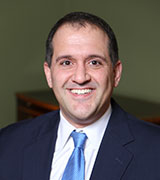- FOKION AVGERINOS – DR. IKE: Athletic Director, Youth Mentor, and Healer
- American Hellenic Institute’s Golden Jubilee Celebration
- Leadership 100 Concludes 33rd Annual Conference in Naples, Florida
- Louie Psihoyos latest doc-series shocks the medical community The Oscar–winning director talks to NEO
- Meet Sam Vartholomeos: Greek-American actor
The Day After

by Endy Zemenides
The Coronavirus crisis has pushed discussion of several other topics to the background, and this column will follow suit. As Prime Minister Mitsotakis announced the lockdown of Greece, he declared that “the greatest weapon against the virus is personal responsibility” and decried the irresponsible actions – most specifically the unnecessary movement of people that increased the chances of community spread – that made the lockdown a necessity.
As the world mobilizes every possible resource and enlists all of humanity to counter this (in Prime Minister Mitsotakis’ words) “invisible, but not invincible, enemy” we can be sure that we will overcome this crisis. Then we will reflect on what could have been done to prevent it.
One critique – that incidentally matches a critique of the pre-9/11 world – was that there was a “failure of imagination”; we did not believe that this could happen on such a scale and that governments and institutions across the board would be so poorly prepared for it. Even as we get past the immediate public health crisis, there are other crises that will emerge from it, and we will soon learn that there are multiple emergencies that we have to deal with as a Greek-American community. So, it is time to “imagine” the worst-case scenarios that will be confronting soon enough.
I. HELP FOR GREEK-AMERICAN BUSINESSES
It is certain that every part of the American economy is going to suffer, but those in the hospitality industry – where our community is overrepresented – may be facing the most immediate existential threat. Both commercial and residential landlords – another key industry for our community – are facing a similar threat.
The community must come together and advocate for financial regulators to extend some of the forbearance measures that they have begun permitting banks to exercise. If banks allow small businesses and landlords to defer multiple months of payments without penalties (because regulators do not pressure banks over such “delinquent” loans), there will be a positive trickle-down effect. Businesses will be able to ramp up and rehire quickly, residents and businesses will be allowed to skip a few mortgage payments without their landlords going into foreclosure, etc.
II. HELP FOR GREECE
This crisis is particularly cruel for Greece, which was in the midst of a solid economic rebound and looking forward to another record setting tourist season. The diaspora was caught a bit flat footed during the Greek economic crisis and did not help Greece as much as it could have back then, so we have to be ready to do so now.
As the U.S. is starting to apply incentives under the Better Utilization of Investments Leading to Development Act – or the BUILD Act – to certain strategic sectors of the Greek economy, we must advocate for the Greek health care sector to receive this “strategic” designation.
We cannot lose sight of Turkey’s continued hybrid warfare against Greece, which was made painfully obvious as Turkey violated Greek airspace and waters, fired chemical weapons at Greek troops guarding the border, and kept weaponized migrants at the border and tried to push them into Greece. There is an obvious reality that we are not doing enough to make people aware of – Greece is the frontline guard of the borders of the Western alliance, and it needs more help. Getting excess equipment from the Coast Guard, the Department of Homeland Security and others to Greece should be an annual policy priority for the community.
Finally, we should consider how we can help Greece make up for significant tourist losses. With year round direct flights to Greece a reality, there should be a campaign for winter break, spring break or Easter in Greece. Greek Orthodox parishes that lead trips abroad should swap out trips to Turkey or Russia with a visit to Meteora or a “follow the footsteps of St. Paul” trip in Greece.
III. HELP FOR GREEK-AMERICAN INSTITUTIONS
From coast to coast, the Greek Orthodox Church was facing perilous financial challenges. These challenges are about to multiply in number and intensity. Revenues lost during Holy Week will not be made up easily. If Greek food festivals in the summer are affected by the Coronavirus crisis, some parishes might not be able to afford to keep the doors open.
Alternative fundraising strategies must be discussed for the Church – as well as for all of our institutions, most of which overwhelmingly rely on large fundraising events which are for the moment not practical. There may also have to be an immediate discussion over whether to push back the date on completing St. Nicholas in order to focus on saving parishes.
As we shelter in place, we should consider these and many more questions. We will have to rebuild so much out of our society and change so much in our way of life coming out of this crisis. We cannot let our imagination fail us now.











0 comments